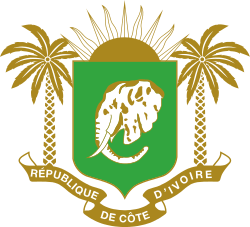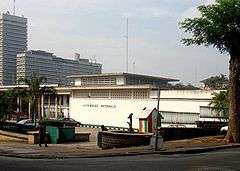Politics of Ivory Coast
 |
| This article is part of a series on the politics and government of Ivory Coast |
|
|
Government |
|
| Foreign relations |
The Politics of Ivory Coast takes place in a framework of a presidential representative democratic republic, whereby the President of Ivory Coast is both head of state and head of government, and of a multi-party system. Executive power is exercised by the government. Legislative power is vested in both the government and parliament.
The capital since 1983 is Yamoussoukro; however, Abidjan remains the administrative center. Most countries maintain their embassies in Abidjan, although some (including the United Kingdom) have closed their missions because of the continuing violence and attacks on Europeans. The population continues to suffer because of an ongoing civil war. International human rights organizations have noted problems with the treatment of captive non-combatants by both sides and the re-emergence of child slavery among workers in cocoa production. Since the incident on 19 September 2002 (see History of Ivory Coast), a civil war broke out, and the north part of the country has been seized by the rebels, the New Forces (FN). A new presidential election was expected to be held in October 2005. However, this new election could not be held on time due to delay in preparation and had been postponed to October 2006 after an agreement was reached amongst the rival parties. After a long delay, elections were finally held in 2010.
Civil war
Troops, mostly hailing from the north of the country, mutinied in the early hours of September 19, 2002. They soon after launched attacks in many cities, including Abidjan. By lunchtime, they had control of the north of the country. Their principal claim relates to the definition of who is a citizen of Ivory Coast (and so who can stand for election as president), voting rights and their representation in government in Abidjan. The events in Abidjan shows that it is not a tribal issue, but a crisis of transition from a dictatorship to a democracy, with the clashes inherent in the definition of citizenship. Forces involved in the conflict include:
- Government forces, the National Army (FANCI), also called loyalists, formed and equipped essentially since 2003
- The Young Patriots: nationalist groups aligned with President Laurent Gbagbo
- Mercenaries recruited by President Gbagbo:
- allegedly, Belarusians
- some former combatants of Liberia, including under-17 youths, forming the so-called "Lima militia"
- New Forces (Forces Nouvelles, FN), ex-northern rebels, who hold 60% of the country; their political expression is the Mouvement patriotique de Côte d'Ivoire, or MPCI
- French forces: troops sent within the framework of Operation Unicorn and under UN mandate (United Nations Operation in Côte d'Ivoire), 3000 men in February 2003 and 4600 in November 2004;
- Soldiers of the Economic Community of West African States (ECOWAS), White helmets, also under the UN.
Executive branch
| Office | Name | Party | Since |
|---|---|---|---|
| President | Alassane Ouattara | Rally of the Republicans | 4 December 2011 |
| Vice-President | TBD | TBD | TBA |
| Prime Minister | Daniel Kablan Duncan | Democratic Party | 21 November 2012 |
Ivory Coast's 1959 constitution provides for strong presidency within the framework of a separation of powers. The executive is personified in the president, elected for a five-year term. The president is commander in chief of the armed forces, may negotiate and ratify certain treaties, and may submit a bill to a national referendum or to the National Assembly. According to the constitution, the President of the National Assembly assumes the presidency in the event of a vacancy, and he completes the remainder of the deceased president's term. The cabinet is selected by and is responsible to the president. Changes are being proposed to some of these provisions, to extend term of office to 7 years, establish a senate, and make president of the senate interim successor to the president.
Laurent Gbagbo took power following a popular overthrow of the interim leader Gen. Robert Guéï who had claimed a dubious victory in presidential elections; Gen. Guéï himself had assumed power on 25 December 1999, following a military coup against the government of former President Henri Konan Bédié. Gbagbo was elected president in 2000 in an election boycotted by many oppositional forces. The president is elected by popular vote for a five-year term; election last held 26 October 2000. The prime minister is usually appointed by the president. The present prime minister is appointed by the international community (South African President Jacob Zuma, Nigerian President Olusegun Obasanjo and Niger President Mamadu Tandja) as transitional Prime Minister following a resolution of the UN Security Council and a resolution of the African Union.
After the Second Ivorian Civil War, Alassane Ouattara is currently the president of Ivory Coast. It was reelected at the 2015 Ivorian presidential election.
After a new constitution was approved by referendum, it is expected President Alassane Ouattara would appoint a Vice-President before 2020. The President and Vice-President will run on a joint ticket from 2020. They will be both elected for a five-year term, with only one possible reelection. The Vice-President will replace the President in case of death, resignation and any other vacancy, .
Legislative branch
Parliament of Ivory Coast will be a bicameral body composed by the National Assembly and the Senate. Prior to November 2016 and the future creation of the Senate, the Parliament of Ivory Coast was only composed of the National Assembly. The National Assembly (Assemblée Nationale) has 225 members, elected for a five-year term in single-seat constituencies. It passes on legislation typically introduced by the president although it also can introduce legislation. The Senate (Sénat) will have two third of senators inderectly elected and one third appointed by the president-elect, elected five-year term in single-seat constituencies. Ivory Coast is a one party dominant state with the Rally of the Republicans in power.
Political parties and elections
| Candidates | Parties | 1st round | 2nd round | ||
|---|---|---|---|---|---|
| Votes | % | Votes | % | ||
| Laurent Gbagbo | Ivorian People's Front | 1,756,504 | 38.04 | 2,054,537 (CC) 2,107,055 (IEC) | 51.45 (CC) 45.9 (IEC) |
| Alassane Ouattara | Rally of the Republicans | 1,481,091 | 32.07 | 1,938,672 (CC) 2,483,164 (IEC) | 48.55 (CC) 54.1 (IEC) |
| Henri Konan Bédié | Democratic Party of Côte d'Ivoire – African Democratic Rally | 1,165,532 | 25.24 | ||
| Albert Mabri | Union for Democracy and Peace in Côte d'Ivoire | 118,671 | 2.27 | ||
| Konan Gnamien | Union for Côte d'Ivoire | 17,171 | 0.37 | ||
| Francis Wodié | Ivorian Workers' Party | 13,406 | 0.29 | ||
| Siméon Konan | 12,357 | 0.27 | |||
| Jacqueline Lohoues | 12,273 | 0.27 | |||
| Pascal Tagoua | 11,674 | 0.25 | |||
| Innocent Anaky | Movement of the Forces of the Future | 10,663 | 0.23 | ||
| Adama Dolo | 5,972 | 0.13 | |||
| N'Douba Enoh Aka | 5,311 | 0.12 | |||
| Félix Akoto Yao | 4,773 | 0.10 | |||
| Henri Tohou | Socialist Union of the People | 2,423 | 0.05 | ||
| Total (turnout 83.73%, 71.28% (CC)/81.12% (IEC)) | 4,617,821 | 100.00 | 3,993,209 (CC) 4,590,219 (IEC) | 100.00 | |
| Source: CEI, abidjan.net (CC), abidjan.net (IEC) | |||||
| Parties | Votes | % | Seats |
|---|---|---|---|
| Ivorian Popular Front (Front populaire ivoirien) | . | 96 | |
| Democratic Party of Côte d'Ivoire (Parti démocratique de la Côte d'Ivoire) | . | 94 | |
| Rally of the Republicans (Rassemblement des républicains) | boycott | 5 | |
| Ivorian Workers' Party (Parti ivoirien des travailleurs) | . | 4 | |
| Union of Democrats of Côte d'Ivoire (Union des Démocrates de Côte d'Ivoire) | . | 1 | |
| Movement of Future Forces (Mouvement des Forces de l'Avenir) | . | 1 | |
| Non-partisans | . | 22 | |
| Vacant | . | 2 | |
| Total (turnout 33.1%) | 1,547,798 | 225 | |
| Source: CNE. These elections were boycotted by the Rally of the Republicans (Rassemblement des républicains) | |||
After five years of delays, new elections were finally held in 2010. The first round of elections were held peacefully, and widely hailed as free and fair. Runoffs are scheduled for 28 November 2010, after being delayed one week from the original date of 21 November. Laurent Gbagbo will defend his post as president against former Prime Minister Alassane Ouattara.[1]
Judicial branch
The judicial system culminates in the Supreme Court of Ivory Coast. The High Court of Justice is competent to try government officials for major offenses. The Supreme Court or Cour Supreme consists of four chambers: Judicial Chamber for criminal cases, Audit Chamber for financial cases, Constitutional Chamber for judicial review cases, and Administrative Chamber for civil cases; there is no legal limit to the number of members.
Administrative divisions
For administrative purposes, Ivory Coast is divided into 58 departments, each headed by a prefect appointed by the central government. There are 196 communes, each headed by an elected mayor, plus the city of Abidjan with ten mayors.
The 58 departments (départements, singular - département) are listed in the article Departments of Ivory Coast.
International organization participation
ACP, AfDB, ECA, ECOWAS, Entente, FAO, FZ, G-24, G-77, IAEA, IBRD, ICAO, ICCt (signatory), ICRM, IDA, IDB, IFAD, IFC, IFRCS, ILO, IMF, IMO, Interpol, IOC, IOM, ISO, ITU, ITUC, MONUC, NAM, OAU, OIC, OPCW, UN, UNCTAD, UNESCO, UNHCR, UNIDO, UPU, WADB (regional), WAEMU, WCO, WFTU, WHO, WIPO, WMO, WToO, WTrO
References
- ↑ Eric Agnero (10 November 2010). "Ivory Coast postpones presidential runoff vote". CNN. Retrieved 11 November 2010.
External links and references
- CIA World Factbook 2003
